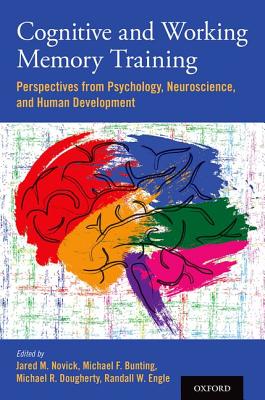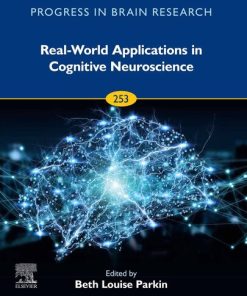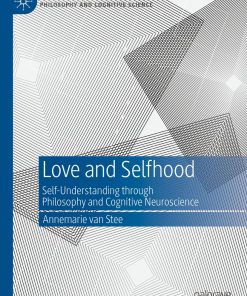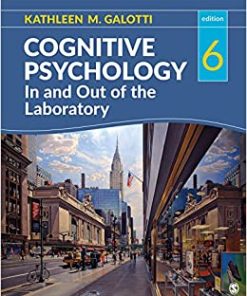Cognitive and Working Memory Training: Perspectives from Psychology, Neuroscience, and Human Development 1st edition by Jared Novick, Michael Bunting, Michael Dougherty 019997750X 9780199977505
$50.00 Original price was: $50.00.$25.00Current price is: $25.00.
Cognitive and Working Memory Training: Perspectives from Psychology, Neuroscience, and Human Development 1st edition by Jared M. Novick, Michael F. Bunting, Michael R. Dougherty – Ebook PDF Instant Download/DeliveryISBN: 019997750X, 9780199977505
Full download Cognitive and Working Memory Training: Perspectives from Psychology, Neuroscience, and Human Development 1st edition after payment.

Product details:
ISBN-10 : 019997750X
ISBN-13 : 9780199977505
Author : Jared M. Novick, Michael F. Bunting, Michael R. Dougherty
Cognitive and Working Memory Training assembles an interdisciplinary group of distinguished authors–all experts in the field–who have been testing the efficacy of cognitive and working memory training using a combination of behavioral, neuroimaging, meta-analytic, and computational modelling methods. This edited volume is a defining resource on the practicality and utility of the field of cognitive training research in general, and working memory training in particular. Importantly, one focus of the book is on the notion of transfer–namely, the extent to which cognitive training–be it through music, video-game play, or working memory demanding interventions at school–generalizes to learning and performance measures that were decidedly not part of the training regimen.
Cognitive and Working Memory Training: Perspectives from Psychology, Neuroscience, and Human Development 1st Table of contents:
I. Cognitive Perspective
1. Cognitive Perspectives of Working Memory Training: Current Challenges in Working Memory Training
Introduction
Investigating Transfer
Criticisms of Working Memory Training
Four Directed Questions
Conclusion
2. Working Memory Training From an Individual Differences Perspective: Efficacy in Older Adults
Introduction
Question 1: Theory of Working Memory Training
Question 2: Major Claims of Working Memory Training
Question 3: Methodological Issues
Question 4: Contributions to the Field
3. Training Working Memory for 100 Days: The COGITO Study
Question 1: Theory of Working Memory Training
Question 2: Major Claims of Working Memory Training
Question 3: Methodological Issues
Question 4: Contributions to the Field
4. How Strong Is the Evidence for the Effectiveness of Working Memory Training?
Introduction
Question 1: Theory of Working Memory Training
Question 2: Major Claims of Working Memory Training
Question 3: Methodological Issues
Question 4: Contributions to the Field
Conclusion
II. Neurocognitive Perspective
5. Neuroscience Perspectives on Cognitive Training
Introduction
Does Training Effectively Target Desired Cognitive Systems?
Do the Benefits of Cognitive Training Transfer?
Do the Benefits of Cognitive Training Persist?
For Whom Is Cognitive Training Most Effective?
Can Behavioral Training Be Augmented With Brain Regulation and Stimulation?
What Neuroscience Approaches on the Horizon Might Change the Cognitive Training Game?
Conclusion
6. Working Memory Training and Transcranial Direct Current Stimulation
Introduction
What Is Transcranial Direct Current Stimulation?
Cognitive Effects of Transcranial Direct Current Stimulation
Pairing WM Training With Transcranial Direct Current Stimulation
How Does Transcranial Direct Current Stimulation Inform Cognitive Training Research?
Final Remarks
Funding and Conflicts of Interest
7. Cognitive Training: Component Processes and Criteria for Change
Introduction
Will the Real Component Process Please Stand Up?
What Does a Training Effect Really Mean?
Conclusions and Future Directions
III. Developmental Perspective
8. Review of the Evidence on, and Fundamental Questions About, Efforts to Improve Executive Functions, Including Working Memory
Introduction
Executive Functions (EFs)
Why It Is Important to Improve EFs
Principles of Experimental Design and Principles for Interpreting Results Often Violated in Training or Intervention Studies
Studies Included in the Systematic Review
Principles That Govern EF Training, Whatever the Form
How Different Approaches to Improving EFs Measure Up
Across ALL Approaches to Improving EFs, Which Are the Most Promising Thus Far?
Across ALL Approaches, Which Have Been Least Successful Thus Far in Improving EFs?
Limitations of the Present Systematic Review and a Call to Others to Analyze the Extant Literature in Ways Other Than We Have
A Call to Researchers to Consider Additional Analyses of Their Data
A Call to Researchers to Study Factors Affecting How Long Benefits Last
What About Training People in Strategies to Minimize the Need for EFs, so That People Do Not Have to Expend So Much Effort Trying to Exercise EFs?
What About Looking at the EF Benefits of Being Outside in Nature?
Our Predictions About How to Most Effectively Improve EFs
Final Thoughts
9. Fundamental Questions Surrounding Efforts to Improve Cognitive Function Through Video Game Training
The Curse of Learning Specificity
Video Game Experience Affecting Cognitive Function
Methodological Issues
Theoretical Issues
Conclusions
10. Logical and Methodological Considerations in Cognitive Training Research
Introduction
Working Memory and Executive Functions
Rethinking Transfer
Evidence of Transfer After Training
Historical Examples and Instrumental Enrichment
Moderating Factors of Cognitive Training
Conclusion
11. Music Training: Contributions to Executive Function
Introduction
Music Training and Cognitive Flexibility
Music Training and Inhibitory Control
Music Training and Working Memory Updating
Randomized Controlled Trials: Music Training and EF
Conclusion
12. The Effectiveness of Training in Task Switching: New Insights and Open Issues From a Life-Span View
Life-Span Changes in Task Switching
Flexibility and Plasticity of Task-Switching Performance Across the Life Span
Age Differences in the Effectiveness of Task-Switching Training Interventions: Training, Transfer, and Maintenance Effects
The Role of Interindividual Differences on Training and Transfer of Task Switching
Summary and Conclusions
Open Issues for Designing Cognitive Intervention Across the Life Span
Epilogue: Don’t Buy the Snake Oil
Are the Effects of WM Training Dependent on the Type of Control Condition Used in the Study Design?
Does Random Assignment to Condition Matter?
Are Training Effects Dependent on the Overlap Between Training and Transfer Task Operations or Stimuli?
What Might a Convincing Study Look Like?
But What About the Brain?
People also search for Cognitive and Working Memory Training: Perspectives from Psychology, Neuroscience, and Human Development 1st:
what is working memory training
does working memory training work
what is cogmed working memory training
can working memory be trained
working memory training programs
Tags:
Cognitive,Working Memory,Perspectives,Psychology,Neuroscience,Human Development,Jared Novick,Michael Bunting,Michael Dougherty
You may also like…
Uncategorized
Business & Economics
Business & Economics - Responsibility and Business Ethics
Politics & Philosophy - Anthropology
Working from Within: The Nature and Development of Quine’s Naturalism Sander Verhaegh
Medicine - Neuroscience
Politics & Philosophy - Anthropology
Uncategorized
Human Behavior in the Social Environment: Perspectives on Development and the Life Course
Uncategorized
Earth Sciences - The Environment












